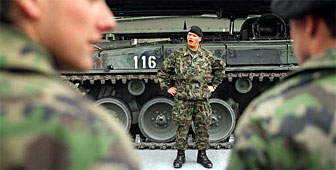Swiss split on military system

The Swiss are divided right down the middle for the first time on whether to abandon their militia army - a system that dates back to the 19th century - and opt for a professional army, according to a survey published today.
The annual survey on Swiss public attitudes to security issues, commissioned by the defence ministry, showed that while 80 percent of the population were still firmly in favour of neutrality they were split on the military model best designed to guarantee this.
The poll also found that for the first time since the surveys began nine years ago, support for membership of the European Union and of the United Nations has fallen. The authors of the survey attributed the drop to the sanctions imposed on Austria by its EU counterparts.
Of 1,202 Swiss polled, 48 per cent favoured joining the EU, five and nine per cent down on two surveys conducted last year. There was a similar drop in those in favour of UN membership, to 57 per cent.
Concerning the military, 57 percent of 18 to 29-year-olds favoured a professional army model, while 60 percent of the over-60s preferred the status quo. Those aged between 30 and 49 were divided equally into the two camps, the survey said.
“For the first time, the number of people favouring a professional army is exactly as large as the number of those preferring the existing militia army format,” the survey said.
Switzerland has the third largest land-based army in Europe after Russia and Turkey, according defence ministry figures.
Its 360,000 staff comprises a vast pool of conscripts – most Swiss men aged 20 to 42 years old – and a professional core of 3,300 instructors.
The Swiss have always come out strongly in favour of keeping this militia army system, which they regard as vital to preserving their traditional neutrality.
Now the Swiss government, under pressure to modernise the military, has commissioned a team of experts to draft radical proposals to cut staff by half, to make the force more efficient, cost-effective and professional, and to keep weapons up to European standards. A professional army system is not under discussion.
Every Swiss male is subject to military service and until 1992, when the constitution was amended to allow alternative civilian service, conscientious objectors were jailed and carried this stigma for the rest of their lives.
Until 1995, conscription lasted over a period of 30 years from age 20 to 50. Since then it has been reduced to 22 years in sweeping army reforms.
Every conscript must now serve two to three weeks every two years. Each soldier keeps his equipment at home, including uniform, weapon, live ammunition and other supplies. He is also legally and financially reponsible for their maintenance and may use his weapon in civilian life as long as he is ready when he is called up.
swissinfo with agencies

In compliance with the JTI standards
More: SWI swissinfo.ch certified by the Journalism Trust Initiative
You can find an overview of ongoing debates with our journalists here. Please join us!
If you want to start a conversation about a topic raised in this article or want to report factual errors, email us at english@swissinfo.ch.